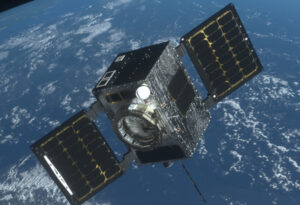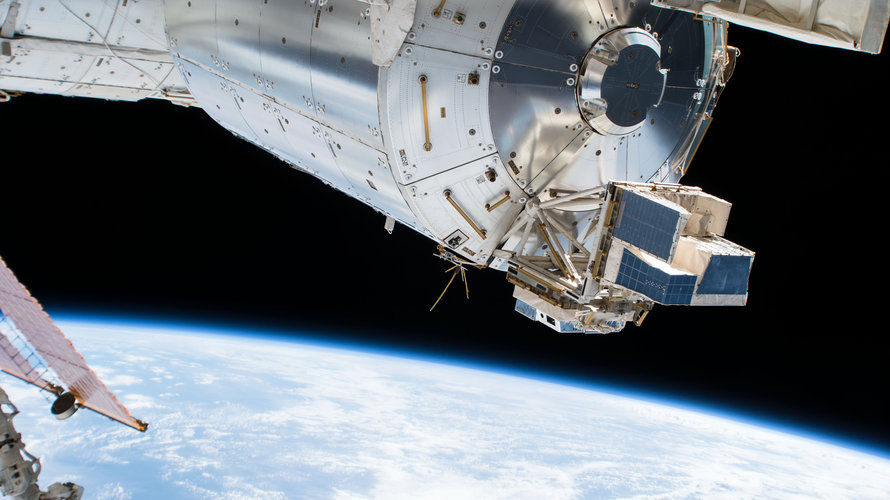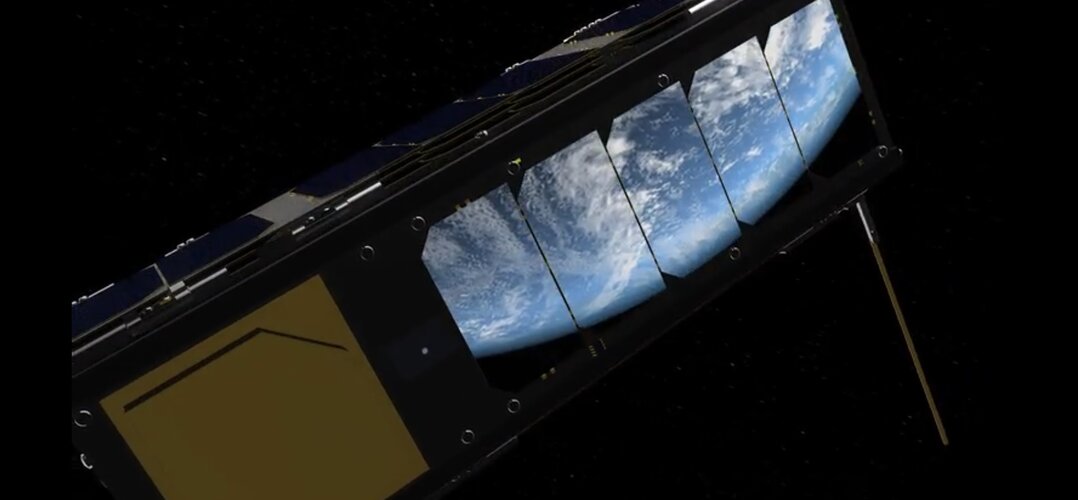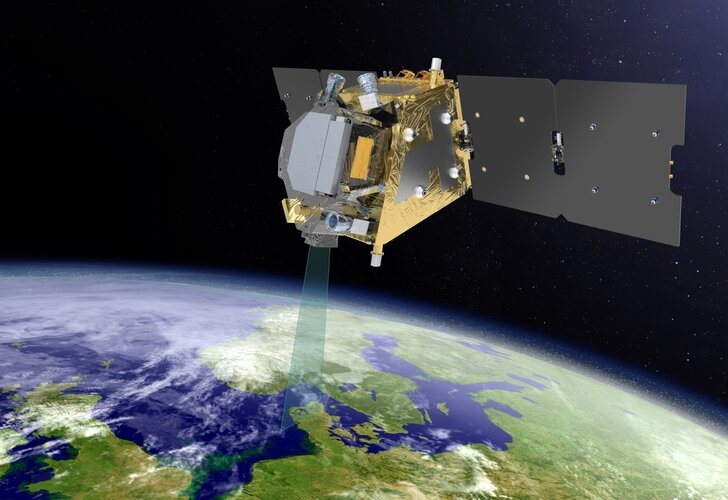Europa Clipper imaging system captures breathtaking 'first light' images
Tuesday, 11 January 2022 13:28
ASU scientists and engineers building the Europa Thermal Emission Imaging System (E-THEMIS) for NASA's Europa Clipper passed a major hurdle recently by capturing the first successful test images from this complex infrared camera, known as "first light" images.
E.T.s may be headed toward Earth, but are we ready for them?
Tuesday, 11 January 2022 13:23
Twenty years from now we might get a call from aliens. In 2017, a powerful radio transmission was aimed at exoplanet GJ 273b, thought to be able to support life. Its message, sent by the alien-hunting group Messaging Extraterrestrial Intelligence International, contained instructions on how to understand Earthling math, music and time. If it lands on intelligent alien ears once it arrives in about a decade, E.T.
HawkEye 360 wins $15.5 million AFRL contract
Tuesday, 11 January 2022 12:17
The U.S. Air Force Research Laboratory (AFRL) awarded HawkEye 360 a $15.5 million contract to provide radio frequency analytics research and development, and to help the government test and evaluate its hybrid space intelligence, surveillance and reconnaissance architecture.
Launch ranges lack spare parts to support growing demand
Tuesday, 11 January 2022 10:41
The Space Force lacks spare parts for much of the equipment needed to support launches from the Eastern and Western Ranges, an issue that could loom larger as launch activities at both spaceports increase.
Breakup of China’s Yunhai-1 (02) satellite linked to space debris collision
Tuesday, 11 January 2022 10:17
U.S. space tracking has linked the breakup of Chinese satellite Yunhai-1 (02) to a collision with a small piece of debris from a Russian satellite launch, according to NASA.
The Incredible ASIM: Distant galaxy edition
Tuesday, 11 January 2022 09:59
The Atmosphere–Space Interactions Monitor, or ASIM for short, is a first-of-its-kind complement of instruments on the International Space Station. Dubbed the ‘space storm hunter’, ASIM measures electric events in Earth’s upper atmosphere with cameras, photometers and X- and gamma-ray detectors.
Live demonstration for cyber resilience
Tuesday, 11 January 2022 09:00
Modern society is growing ever-more reliant on services and data delivered via space. Cyber threats and disruptions to satellites are increasingly dangerous to citizens and economies, and it is vital to protect them and the crucial work they do. This is why ESA is supporting Swiss-based security firm Cysec in organising Europe’s first live cybersecurity demonstration for space systems. The demonstration will highlight the challenges in making space systems cybersecurity resilient vs modern hacking techniques and capabilities.
Preview 2022
Tuesday, 11 January 2022 08:00 Video:
00:06:30
Video:
00:06:30
As always, a new year brings new and exciting missions and launches for ESA. In science the world looks forward to the first image releases of the recently launched James Webb Space Telescope and the third data release for Gaia, both teaching us more about our galaxy and Universe. ESA’s new Mars rover will be launched with the ExoMars mission, and we will also see the maiden flight of Vega-C and the Artemis I flight. Astronaut Samantha Cristoforetti will return to the ISS for her second mission and a new class of astronauts will be presented to the world. After the groundwork has been
Ride into space on Vega-C secured for FLEX and Altius
Tuesday, 11 January 2022 08:00
A contract signed with Arianespace secures the joint launch for two satellites that will further knowledge of our home planet. Scheduled to lift off on a new class of rocket, ESA’s Vega-C, from Europe’s Spaceport in mid-2025, FLEX will yield new information about the health of the world’s plants and Altius will deliver profiles of ozone and other trace gases in the upper atmosphere to support services such as weather forecasting.
Study reveals more hostile conditions on Earth as life evolved?
Tuesday, 11 January 2022 07:49 During long portions of the past 2.4 billion years, the Earth may have been more ?inhospitable?to life than scientists previously thought, according to?new?computer simulations.
Using a state-of-the-art climate model, researchers now believe the level of ultraviolet (UV) radiation reaching the Earth's surface could have been underestimated, with UV levels being up to ten times higher.
During long portions of the past 2.4 billion years, the Earth may have been more ?inhospitable?to life than scientists previously thought, according to?new?computer simulations.
Using a state-of-the-art climate model, researchers now believe the level of ultraviolet (UV) radiation reaching the Earth's surface could have been underestimated, with UV levels being up to ten times higher. Eccentric exoplanet discovered
Tuesday, 11 January 2022 07:49 Led by the University of Bern, an international research team has discovered a sub-Neptune exoplanet orbiting a red dwarf star. The discovery was also made thanks to observations performed by the SAINT-EX observatory in Mexico. SAINT-EX is run by a consortium including the Center for Space and Habitability (CSH) at the University of Bern and the National Center of Competence in Research NCCR Pla
Led by the University of Bern, an international research team has discovered a sub-Neptune exoplanet orbiting a red dwarf star. The discovery was also made thanks to observations performed by the SAINT-EX observatory in Mexico. SAINT-EX is run by a consortium including the Center for Space and Habitability (CSH) at the University of Bern and the National Center of Competence in Research NCCR Pla Asteroid with a refreshed surface
Tuesday, 11 January 2022 07:49 How did our Solar System form and evolve? Various models for the creation of our system of planets have been proposed, but the planets themselves provide unfortunately little information as their interiors have melted and erased evidence of the early stages of formation. However, situated between Mars and Jupiter, are the asteroids of the asteroid belt whose smaller size means they are thought t
How did our Solar System form and evolve? Various models for the creation of our system of planets have been proposed, but the planets themselves provide unfortunately little information as their interiors have melted and erased evidence of the early stages of formation. However, situated between Mars and Jupiter, are the asteroids of the asteroid belt whose smaller size means they are thought t Hubble sees cosmic clues in a galactic duo
Tuesday, 11 January 2022 07:49 This spectacular image from the NASA/ESA Hubble Space Telescope captures the spiral galaxy NGC 105, which lies roughly 215 million light-years away in the constellation Pisces. While it looks like NGC 105 is plunging edge-on into a neighboring galaxy, this is just a circumstance of perspective. NGC 105's elongated neighbor is actually far more distant. Such visual associations are the result of
This spectacular image from the NASA/ESA Hubble Space Telescope captures the spiral galaxy NGC 105, which lies roughly 215 million light-years away in the constellation Pisces. While it looks like NGC 105 is plunging edge-on into a neighboring galaxy, this is just a circumstance of perspective. NGC 105's elongated neighbor is actually far more distant. Such visual associations are the result of Physicist seeks to understand dark matter with Webb Telescope
Tuesday, 11 January 2022 07:49 The much-anticipated launch of the James Webb Space Telescope will usher in a new era of research on our universe. Among the many researchers planning to take advantage of the data from the Hubble Space Telescope's successor is Carnegie Mellon University Associate Professor of Physics Matthew Walker, who is principal investigator of a program making use of data collected in telescope's first yea
The much-anticipated launch of the James Webb Space Telescope will usher in a new era of research on our universe. Among the many researchers planning to take advantage of the data from the Hubble Space Telescope's successor is Carnegie Mellon University Associate Professor of Physics Matthew Walker, who is principal investigator of a program making use of data collected in telescope's first yea Amazon helps develop Alexa-like Callisto system for Artemis moon mission
Tuesday, 11 January 2022 07:49 Lockheed Martin has teamed up with Amazon and Webex to demonstrate technology on NASA's lunar Orion space capsule that will use software similar to Amazon's virtual assistant Alexa.
The demonstration, called Callisto, will fly on the uncrewed Artemis 1 lunar mission that NASA hopes to launch in the next few months. It won't be able to control the spacecraft, but it will be able to turn
Lockheed Martin has teamed up with Amazon and Webex to demonstrate technology on NASA's lunar Orion space capsule that will use software similar to Amazon's virtual assistant Alexa.
The demonstration, called Callisto, will fly on the uncrewed Artemis 1 lunar mission that NASA hopes to launch in the next few months. It won't be able to control the spacecraft, but it will be able to turn 
